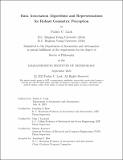Data Association Algorithms and Representations for Robust Geometric Perception
Author(s)
Lusk, Parker C.
DownloadThesis PDF (12.43Mb)
Advisor
How, Jonathan P.
Leonard, John J.
Atanasov, Nikolay
Terms of use
Metadata
Show full item recordAbstract
Data association is a fundamental requirement of geometric estimation in robotics. Identifying correspondences between measurements and models enables estimation processes to incorporate more data, in general leading to better estimates. However, sensor data is replete with noise and spurious measurements, making data association considerably more challenging. This thesis addresses data association problems that arise in realistic robotic perception, thus enabling robust geometric estimation. The first contribution of this thesis is the introduction of a scalable algorithm that efficiently identifies pairwise correspondences in high-outlier scenarios without initial data alignment. By modeling the pairwise association problem using a weighted graph, large complete subgraphs of highly consistent associations can be found without sacrificing information through thresholding, unlike previous methods. The second contribution is the introduction of a novel representation for lines and planes using the affine Grassmannian manifold. This thesis looks beyond points to higherorder geometric abstractions and provides a means for robustly aligning line and plane landmarks without an initial guess. When applied to lidar-based localization and loop closure, which face challenges in registering sparse point clouds, higher accuracy and success rates are achieved compared to typical representations. The third contribution of this thesis is to extend pairwise data association to multiway data association, wherein multiple pairs of associations are jointly analyzed to improve their accuracy and to ensure their consistency. By leveraging insights from the spectral graph clustering literature, this thesis develops an algorithm that is computationally efficient and provides accurate solutions with guaranteed global consistency. The final contribution of this thesis is to develop a multiway association algorithm that is capable of operating directly on pairwise affinities, unlike previous work which assumes the availability of pairwise binary permutation matrices. By delaying pairwise decision making until many pairwise affinities can be analyzed together, higher accuracy associations can be made. Taken together, these contributions improve the robustness of data association, allowing reliable geometric estimation in the presence of uncertainty.
Date issued
2023-09Department
Massachusetts Institute of Technology. Department of Aeronautics and AstronauticsPublisher
Massachusetts Institute of Technology